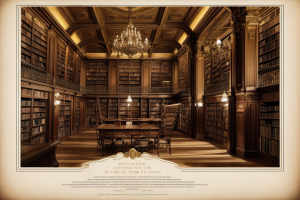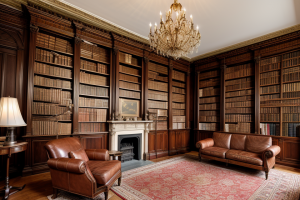
Literature is a treasure trove of knowledge, wisdom, and imagination that has been passed down through generations. The classics are a testament to the enduring power of storytelling and the human experience. From timeless love stories to thought-provoking philosophical works, these books have left an indelible mark on literature and continue to inspire readers today. In this article, we explore the must-read classics of literature that should be on every bookshelf. These classic books are not only a glimpse into the past but also a window into the human soul, offering insights into the human condition and the world we live in. So, let’s embark on a journey through the pages of history and discover the timeless treasures of literature.
Classic Novels for Every Reader
The Great Gatsby by F. Scott Fitzgerald
- Published in 1925, “The Great Gatsby” is a literary masterpiece that captures the essence of the Roaring Twenties in America.
- Set in the fictional town of West Egg on Long Island, the novel revolves around the enigmatic Jay Gatsby and his obsessive pursuit of the elusive Daisy Buchanan.
- Through the eyes of the narrator, Nick Carraway, readers are taken on a journey into the world of wealth, extravagance, and moral decay.
- The novel’s themes are as relevant today as they were in the 1920s, exploring the corrupting influence of wealth, the American Dream, and the destructive nature of love.
- Fitzgerald’s use of symbolism and imagery, combined with his poetic prose, make “The Great Gatsby” a must-read for anyone interested in literature.
To Kill a Mockingbird by Harper Lee
- A coming-of-age tale set in the Deep South
- Narrated by a young girl named Scout Finch
- Takes place in the fictional town of Maycomb, Alabama during the Great Depression
- Surrounded by traditional values and racial tensions
- The loss of innocence and the struggle for justice
- Scout’s father, Atticus Finch, is appointed to defend a black man falsely accused of raping a white woman
- The trial exposes the deep-seated prejudices and injustices of the community
- Scout witnesses the destruction of her childhood illusions as she learns about the harsh realities of the world
- The enduring power of empathy and compassion in the face of prejudice
- Scout’s empathetic nature allows her to see beyond the surface-level differences between people
- Her friendship with a reclusive neighbor, Boo Radley, reveals the humanity behind the local myths and legends
- The novel demonstrates the potential for change and growth in individuals and communities when empathy and compassion are nurtured and embraced
Pride and Prejudice by Jane Austen
- A witty and romantic examination of Georgian society
- Set in the early 19th century, Pride and Prejudice is a humorous and heartwarming novel that offers a glimpse into the customs and values of Georgian England. Austen’s keen observations of society and her sharp wit are on full display in this classic work.
- The spirited Elizabeth Bennet and her relationship with the enigmatic Mr. Darcy
- The novel centers around the strong-willed and intelligent Elizabeth Bennet and her tumultuous relationship with the haughty and aloof Mr. Darcy. Through their clashes and eventual reconciliation, Austen explores themes of pride, prejudice, and the transformative power of love.
- Themes of love, pride, and the importance of understanding one’s own flaws
- Pride and Prejudice is a timeless exploration of human nature and the complexities of love. Austen delves into the themes of pride and prejudice, as well as the importance of self-awareness and growth. This novel is a must-read for anyone looking to be swept away by a captivating love story that remains relevant over two centuries after its publication.
1984 by George Orwell
- A dystopian vision of a totalitarian future
In the novel, George Orwell presents a bleak vision of the future in which the government wields complete control over its citizens. The protagonist, Winston Smith, works for the government and is tasked with rewriting history to align with the party’s propaganda. However, as he becomes increasingly disillusioned with his job and the society he lives in, he begins to question the government’s control and the truth of the information he is tasked with altering.
- The psychological struggle of the protagonist, Winston Smith
Throughout the novel, Winston Smith grapples with his own sense of rebellion and his desire to break free from the government’s control. He becomes obsessed with the idea of joining a rebellion and overthrowing the government, but he is also plagued by fear of being caught and punished. His internal struggle is a central theme of the novel, as he navigates the dangers of living in a society where even his own thoughts are monitored and controlled.
- Themes of control, rebellion, and the power of language
Orwell explores themes of control and rebellion throughout the novel, as Winston Smith struggles to find a way to resist the government’s power. The novel also delves into the power of language and the ways in which language can be used to manipulate and control people. The government in the novel uses Newspeak, a deliberately impoverished language, to limit the range of thought and expression available to its citizens. As Winston Smith becomes more aware of the government’s manipulation of language, he begins to see the importance of preserving the English language and the ideas it represents.
Classic Works of Literature
The Odyssey by Homer
- The Epic Journey of the Hero Odysseus
- Odysseus, the legendary king of Ithaca, sets out on a journey to return home after the Trojan War. His ten-year journey is filled with encounters with fantastical creatures, trials, and challenges that test his bravery and cunning.
- Encounters with Fantastical Creatures and Trials on the Way Home
- During his journey, Odysseus faces various obstacles, including a cyclops, a sea monster, and a sorceress. He must use his wit and intelligence to overcome these challenges and continue on his way home.
- Themes of Bravery, Cunning, and the Power of the Gods
- The Odyssey explores themes of bravery, cunning, and the power of the gods. Odysseus’s journey tests his strength and intelligence, and he must rely on his wits to survive. The gods also play a significant role in his journey, often intervening in his life and testing his faith.
Hamlet by William Shakespeare
- A tragic tale of betrayal and revenge
- The story revolves around Prince Hamlet of Denmark, who is seeking vengeance for the murder of his father, King Hamlet.
- However, Hamlet’s journey towards revenge is complicated by his own inner turmoil and his struggle with his conscience.
- The complex character of Prince Hamlet
- Hamlet is a multi-faceted character who is known for his intelligence, wit, and poetic skills.
- He is also depicted as being indecisive, moody, and prone to bouts of madness.
- These contradictory traits make Hamlet a complex and intriguing character that readers can relate to on many levels.
- Themes of madness, death, and the nature of the human soul
- Throughout the play, there are numerous references to madness, both real and feigned.
- The theme of death is also prominent, as it is the driving force behind the plot and the ultimate fate of many of the characters.
- Additionally, the play raises questions about the nature of the human soul and the consequences of our actions.
- Overall, these themes add depth and complexity to the story and make it a timeless classic that continues to resonate with readers today.
The Divine Comedy by Dante Alighieri
- A journey through Hell, Purgatory, and Heaven
- The epic poem follows the journey of Dante, the protagonist, through the three realms of the afterlife, each representing a stage of spiritual purification.
- Dante’s encounter with historical and mythological figures
- Along the way, Dante encounters numerous historical and mythological figures, such as Virgil, Beatrice, and various sinners and saints, who embody different aspects of human nature and divine justice.
- Themes of sin, redemption, and the search for spiritual enlightenment
- Through its vivid depictions of the afterlife and its exploration of the human condition, “The Divine Comedy” grapples with universal themes of sin, redemption, and the quest for spiritual enlightenment, making it a timeless and profound work of literature.
The Canterbury Tales by Geoffrey Chaucer
- A collection of stories told by a group of pilgrims on a journey to Canterbury
- The stories, which range from romantic to bawdy, offer a glimpse into the lives and social hierarchies of medieval England
- The characters in the tales represent different strata of society, from the nobility to the peasantry, and their stories reflect the hopes, fears, and desires of their respective classes
- The themes of love, deception, and the universal human experience are explored in depth throughout the tales
- Love is depicted in many forms, from chivalrous and noble to lustful and base, and the tales often examine the consequences of pursuing it at any cost
- Deception, whether through flattery, trickery, or outright fraud, is a common theme, and the tales often expose the motivations and machinations of the characters who resort to it
- The human experience is also a central theme, and the tales explore the full range of emotions and experiences that make up the human condition, from joy and laughter to sorrow and despair.
- The stories, which range from romantic to bawdy, offer a glimpse into the lives and social hierarchies of medieval England
Overall, The Canterbury Tales is a rich and varied collection of stories that offers a unique perspective on life in medieval England and remains a timeless treasure of world literature.
Classic Poetry
Paradise Lost by John Milton
- Paradise Lost is an epic poem written by John Milton in the 17th century.
- The poem recounts the fall of Satan and the rebellion of mankind.
- The story begins with the fall of Lucifer, who rebels against God and is cast out of heaven.
- Milton explores themes of pride, free will, and the struggle between good and evil throughout the poem.
- The poem is written in blank verse, which is a form of poetry that consists of unrhymed iambic pentameter.
- Milton’s use of blank verse was innovative at the time and has since become a common form of poetry.
- The poem also explores Christian theology, particularly the concept of the fall of man and the role of Satan in that fall.
- Milton’s depiction of Satan as a complex and multifaceted character has been praised by critics.
- The poem has been widely influential and has inspired many later works of literature, including Faust by Christopher Marlowe and The Divine Comedy by Dante Alighieri.
- It is considered one of the greatest works of English literature and a must-read classic.
The Waste Land by T.S. Eliot
- A modernist poem that reflects the disillusionment of the post-World War I era
- Images of spiritual and cultural decay, and the fragmented nature of human experience
-
Themes of death, sexuality, and the search for meaning in a fragmented world
-
Published in 1922, “The Waste Land” was T.S. Eliot’s first major poem and marked the beginning of his career as a modernist poet
- The poem is considered one of the most important works of modernist poetry, and it reflects the disillusionment and fragmentation of society after World War I
- Through vivid images and allusions to classical literature, Eliot explores themes of death, sexuality, spiritual decay, and the fragmented nature of human experience
- The poem jumps between multiple characters and locations, creating a fragmented narrative that reflects the fragmented state of modern society
- The poem’s conclusion, “And the fire is burning, burning, burning,” has become one of the most famous lines in modernist poetry and captures the sense of existential crisis and uncertainty of the modern world
- Eliot’s use of multiple literary and cultural references, along with his innovative use of syntax and imagery, make “The Waste Land” a must-read classic of modernist poetry.
The Love Song of J. Alfred Prufrock by T.S. Eliot
- A Stream-of-Consciousness Exploration of the Inner Life of the Modern Individual
- Prufrock, the protagonist, navigates the complexities of his own mind and the world around him. Through his inner monologue, Eliot delves into the human psyche and captures the essence of modern-day existentialism.
- Themes of Self-Doubt, Insecurity, and the Passage of Time
- Prufrock grapples with the fleeting nature of time and the uncertainty of his own existence. His insecurities manifest in his relentless self-analysis and constant questioning of his own worth.
- Eliot’s Innovative Use of Literary Techniques
- Eliot employs a range of literary devices, including allusions, metaphors, and unconventional sentence structures, to create a rich and multi-layered poem. His use of stream-of-consciousness technique adds to the depth and complexity of the work, providing readers with a unique insight into Prufrock’s mind.
In “The Love Song of J. Alfred Prufrock,” T.S. Eliot offers a captivating portrayal of the modern individual’s inner life. Through Prufrock’s musings, Eliot explores themes of self-doubt, insecurity, and the passage of time, while also showcasing his innovative use of literary techniques. The poem’s stream-of-consciousness style allows readers to delve into Prufrock’s mind and better understand the human psyche in the modern world.
Sonnets from the Portuguese by Elizabeth Barrett Browning
- Introduction
- A collection of love poems written for her husband, Robert Browning
- Reflects themes of passion, devotion, and the strength of human connection
- Barrett Browning’s innovative use of sonnet form and her exploration of the complexities of love
- Background
- Elizabeth Barrett Browning was an English poet who lived in the 19th century
- She wrote extensively on topics such as love, spirituality, and social justice
- Sonnets from the Portuguese was published in 1850, two years after her marriage to Robert Browning
- Structure and Style
- The collection consists of 44 sonnets, each addressed to her husband
- Barrett Browning’s use of the sonnet form is notable for its departure from traditional structures
- She employs a conversational tone, using enjambment and slant rhymes to create a sense of intimacy and spontaneity
- Themes and Significance
- Love and devotion are central themes throughout the collection
- Barrett Browning’s exploration of the complexities of love is evident in her portrayal of both the joys and challenges of intimacy
- The poems also reflect on the power of human connection and the ways in which love can transcend obstacles
- Sonnets from the Portuguese is widely regarded as a masterpiece of English poetry and a testament to the enduring power of love
FAQs
1. What are the classic books everyone should read?
Answer: There are many classic books that everyone should read at least once in their lifetime. Some of the most highly recommended include:
* “To Kill a Mockingbird” by Harper Lee
* “Pride and Prejudice” by Jane Austen
* “The Great Gatsby” by F. Scott Fitzgerald
* “The Catcher in the Rye” by J.D. Salinger
* “The Adventures of Huckleberry Finn” by Mark Twain
* “The Odyssey” by Homer
* “The Iliad” by Homer
* “War and Peace” by Leo Tolstoy
* “Anna Karenina” by Leo Tolstoy
* “Don Quixote” by Miguel de Cervantes
These books are considered classics because they have stood the test of time and continue to be widely read and appreciated.
2. Why should I read classic books?
Answer: Reading classic books can be a valuable experience for several reasons. First, these books often deal with timeless themes and issues that are still relevant today, making them a valuable source of insight and understanding. Additionally, reading classics can help improve your reading comprehension and vocabulary, as well as broaden your cultural knowledge and appreciation. Finally, many classic books are considered masterpieces of literature, and reading them can be a deeply enriching and enjoyable experience.
3. Are classic books difficult to understand?
Answer: Some classic books can be challenging to understand, particularly if they were written in a different time period and use language or styles that are unfamiliar to modern readers. However, many classic books are written in a clear and accessible style, and with a little effort, most readers can understand and appreciate them. Additionally, there are many resources available to help readers understand and interpret classic books, such as annotations, criticism, and discussion groups.
4. How do I get started reading classic books?
Answer: If you’re new to reading classic books, a good place to start is by choosing a book that you’re interested in and that is considered a “greatest hit” or a “must-read” in the genre. For example, if you’re interested in novels, you might start with “Pride and Prejudice” by Jane Austen or “The Great Gatsby” by F. Scott Fitzgerald. If you’re interested in poetry, you might start with “The Odyssey” by Homer or “Don Quixote” by Miguel de Cervantes. Once you’ve chosen a book, find a quiet, comfortable place to read and set aside some time each day to devote to reading. Don’t be afraid to ask for help or clarification if you need it, and don’t worry if you don’t understand everything right away – reading classic books is a process, and it’s okay to take your time and savor the experience.






